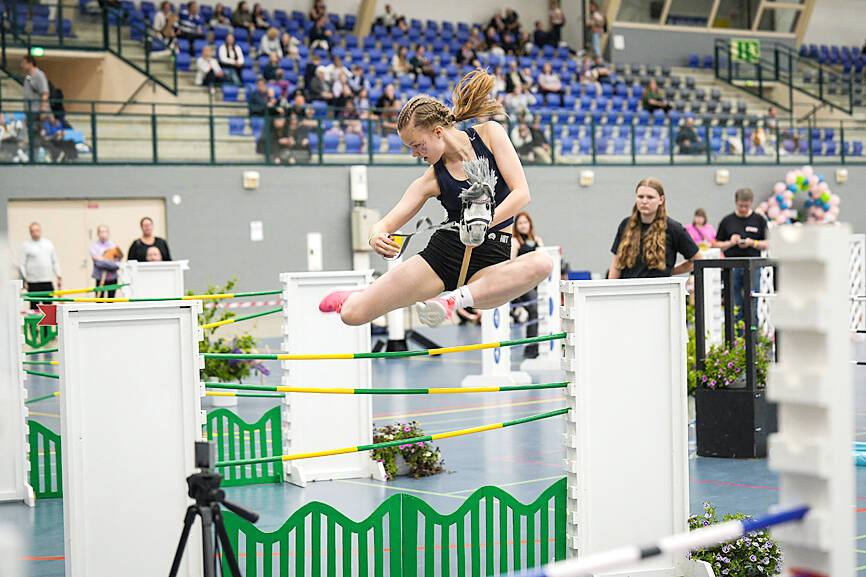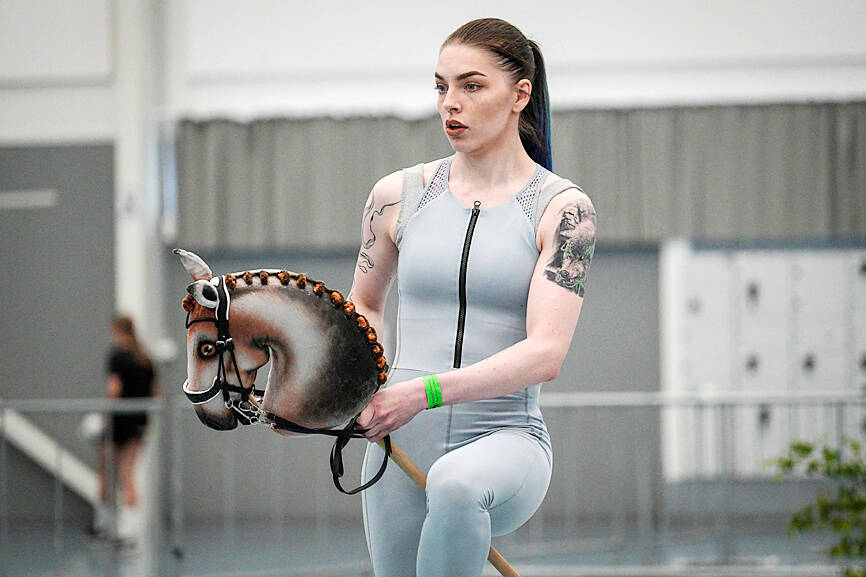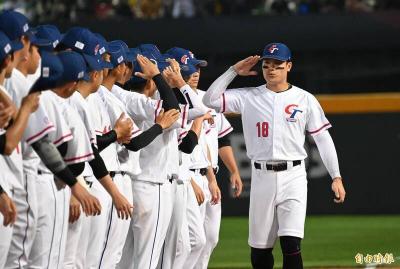A buzz of excitement crackled through the hushed arena as the rider gripped the reins of her stuffed steed.
Welcome to the strangely exacting world of hobby-horsing, the Finnish sport guaranteed to put a smile on your face.
Immaculately coiffed equestrians leap athletically over fences just like in horse jumping, going as fast as they can against the clock straddling their stick steeds.

Photo: AFP
Things are more stately in the dressage, with riders trotting their stick horses with intricately decorated stuffed heads before the discerning eyes of the judges.
About 260 riders from 22 countries — most women and girls aged 10 to 20 — turned up to compete at the 11th annual Finnish Hobbyhorse Championships in Seinajoki.
Despite its vast international reach, from the arctic to Argentina, hobby-horsing is a sport that dares not speak its name.

Photo: AFP
Despite its soaring popularity, it is not officially recognized as a proper sport in its birthplace.
“We have faced so much bullying and judgement,” rider Nara Arlin, 24, said. “We know what everyone in the hobby-horsing has been through... I think that is the main thing that pulls us together.”
First invented in Finland more than a decade ago, hobby-horsing has taken off at a gallop across the globe.
“It is growing every year,” said Julia Mikkonen, the chair of the Finnish Hobbyhorse Association.
This year’s championship was “the biggest we have had so far,” she said.
Beyond the whimsy, great strength and skill are required to jump the obstacles while holding the hobbyhorse.
Some top competitors could give elite hurdlers or gymnasts a run for their money.
“If you jump over obstacles your hip mobility has to be absolutely insane,” Mikkonen, 20, said.
Some fences are up to 110cm tall.
“Of course we are all dreaming of having a world championship one day,” said Mikkonen, who estimates there are about 10,000 hobby-horsers globally.
“I am still a bit breathless, but I am happy with my performance,” 19-year-old Jojo Hanninen said, as she sat down after her dressage event.
To succeed in the sport you have to channel your inner centaur, she said.
“In hobby-horsing, my legs are the horse... I am both horse and human,” she said.
Hanninen’s hobbyhorse is a gray called Toope, with glittery reins and pink ribbons adorning its white mane.
Competitors go to great lengths with their horses — which are also exhibited and judged — modeling and sewing the heads and adorning them with decorations.
“Hobbyhorses are art,” said Arlin, who makes her own.
With the cheers of the crowd still ringing in her ears after an impressive show jumping round, she hailed the sport as “the best hobby ever.”
“You are doing so many things with your hands, brain and the whole body,” she said.
Like many of her peers, Arlin found hobby-horsing through play as a child.
“But the older I became, it became more serious,” said the rider, who trains by riding real horses, working out in the gym and doing pole dancing.”
Rainbow flags in the arena reflected the tolerant values underpinning the community.
“Horses are mostly seen as a girls’ sport, but that is not correct. Anyone can come no matter what gender,” Mikkonen said.
Enthusiast praise the welcoming community that kept them devoted to hobby-horsing, despite the scornful attitudes they encountered at some point.
“We have each other’s backs,” Arlin said.

The qualifying round of the World Baseball Classic (WBC) is to be held at the Taipei Dome between Feb. 21 and 25, Major League Baseball (MLB) announced today. Taiwan’s group also includes Spain, Nicaragua and South Africa, with two of the four teams advancing onto the 2026 WBC. Taiwan, currently ranked second in the world in the World Baseball Softball Confederation rankings, are favorites to come out of the group, the MLB said in an article announcing the matchups. Last year, Taiwan finished in a five-way tie in their group with two wins and two losses, but finished last on tiebreakers after giving

North Korea’s FIFA Under-17 Women’s World Cup-winning team on Saturday received a heroes’ welcome back in the capital, Pyongyang, with hundreds of people on the streets to celebrate their success. They had defeated Spain on penalties after a 1-1 draw in the U17 World Cup final in the Dominican Republic on Nov. 3. It was the second global title in two months for secretive North Korea — largely closed off to the outside world; they also lifted the FIFA U20 Women’s World Cup in September. Officials and players’ families gathered at Pyongyang International Airport to wave flowers and North Korea flags as the

For King Faisal, a 20-year-old winger from Ghana, the invitation to move to Brazil to play soccer “was a dream.” “I believed when I came here, it would help me change the life of my family and many other people,” he said in Sao Paulo. For the past year and a half, he has been playing on the under-20s squad for Sao Paulo FC, one of South America’s most prominent clubs. He and a small number of other Africans are tearing across pitches in a country known as the biggest producer and exporter of soccer stars in the world, from Pele to Neymar. For

Coco Gauff of the US on Friday defeated top-ranked Aryna Sabalenka 7-6 (7/4), 6-3 to set up a showdown with Olympic champion Zheng Qinwen in the final of the WTA Finals, while in the doubles, Taiwan’s Chan Hao-ching was eliminated. Gauff generated six break points to Belarusian Sabalenka’s four and built on early momentum in the opening set’s tiebreak that she carried through to the second set. She is the youngest player at 20 to make the final at the WTA Finals since Denmark’s Caroline Wozniacki in 2010. Zheng earlier defeated Wimbledon champion Barbora Krejcikova of the Czech Republic 6-3, 7-5 to book